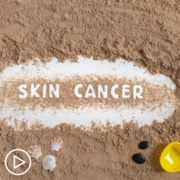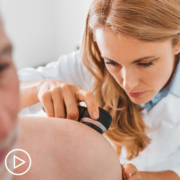Advanced Non-Melanoma Skin Cancer: What Do You Need to Know About Evolving Treatment and Research? from Patient Empowerment Network on Vimeo.
Treatment options for advanced non-melanoma skin cancers—such as squamous and basal cell carcinoma—are evolving quickly. Dr. Diwakar Davar shares an update on emerging research, discusses current treatment options, and provides tips for partnering with your team on care decisions.
Dr. Diwakar Davar is the Clinical Director of the Melanoma and Skin Cancer Program at UPMC Hillman Cancer Center. Learn more about Dr. Davar.
Download Guide
See More from Evolve Non-Melanoma Skin Cancer
Related Resources
Transcript:
Katherine:
Hello, and welcome. I’m your host, Katherine Banwell. Today’s program focuses on helping patients with advanced non-melanoma skin cancer. We’ll review treatments, and research, and share advice for getting involved in care decisions. Before we meet our guest, let’s review a few important details. The reminder email you received about this program contains a link to a program resource guide. If you haven’t already, click that link to access information to follow along during the webinar.
At the end of this program, you’ll receive a link to a program survey. Please take a moment to provide feedback about your experience today in order to help us plan future webinars. Finally, before we get into the discussion, please remember that this program is not a substitute for seeking medical advice.
Please refer to your healthcare team about what might be best for you. Let’s meet our guest today. Joining me is Dr. Diwakar Davar. Dr. Davar, welcome. Would you please introduce yourself?
Dr. Davar:
Katherine, thank you for this invitation. My name is Diwakar. I’m a medical oncologist and I’m the Clinical Director of Cutaneous Malignancies and Melanoma at the University of Pittsburgh’s Hillman Cancer Center. My practice largely focuses on advanced skin cancer, including both melanoma and non-melanoma skin cancers. I also direct the translational research laboratory focusing on drug development. I’m glad to be able to contribute towards this program. And, I’m happy to answer any questions that you and your colleagues might have.
Katherine:
Well, thank you so much for taking time out of your schedule to join us today.
Dr. Davar:
Sure.
Katherine:
Today, we’re focusing on the most common forms of advanced non-melanoma skin cancer. What does it mean to have advanced non-melanoma skin cancer?
Dr. Davar:
Sure. “Non-melanoma skin cancer” is actually a very broad, heterogenous term and includes patients with cutaneous squamous cell carcinoma, which is actually the commonest cancer in the United States with approximately 1 million cases a year, the vast majority of which are actually not necessarily, particularly serious or deep but do indicate predisposition towards further cancers and exposure to carcinogenic ultraviolet light.
It also includes the entities of Merkel cell carcinoma as well as basal cell carcinoma. These common cancers ranging from very common cutaneous squamous cell carcinoma to the least common Merkel cell carcinoma and basal cell in between are primarily seen in Caucasian patients. There is a predisposition towards these cancers we discovered in patients who are older, and certainly there is a predisposition in finding these cancers in certain anatomical regions such as the head and neck areas. Most of these cancers happen in older Caucasian patients, typically above the clavicle in the head, neck, around the ears, and on the cheeks and the face.
Katherine:
Why is that?
Dr. Davar:
Well, the primary etiologic agent driving carcinogenesis in these cancers is ultraviolet light.
Again, the vast majority of ultraviolet light exposure happens to people before the age of 12, and it happens predominantly on the head and neck because that is the area that is most exposed to the sun. The cancer takes a while to form because the carcinogenic effects take a while to cause the cancer. So predominantly, patients, as they start hitting their 70s and 80s, it becomes increasingly common and occasionally, these cancers can actually end up being serious and start causing advanced cancers.
Dr. Davar:
You know, in most cases, the definition of what is considered an advanced cancer is stage IV disease. If you have lung cancer, advanced lung cancer is stage IV cancer that has spread to the opposite lung, or to the brain, or the liver.
If you have advanced melanoma, it is cancer that has spread to a distant organ such as the lung, the liver, or the brain. Skin cancer is very, very different. Because of its unique anatomical location, even a large tumor that potentially can be cut out but hasn’t necessarily spread can still threaten vital organs. You can have a 3 cm tumor near the eye that is threatening the globe. If it is not shrunk, the surgical resection of this tumor will potentially involve removing the eye.
Similarly, you can have a very large tumor that is not necessarily spread, but is involving the right side of the cheek near the jaw. In which case, the potential surgical removal of this tumor would involve the extremely disfiguring surgery of jaw removal, what is known as mandibulectomy.
Given the nature of these tumors and the location of these tumors, the definition of locally advanced for this particular cancer has started to incorporate more elements of the location and the ease of which the cancer can be removed, which is very distinct from cancers in other locations, and also the proximity of these cancers to critical structures such as the nose, the lips, the eye, as well as critical vascular and neurovascular structures in the neck, such as the carotid artery, the internal and external jugular veins, and the vagal nerve bundle.
Katherine:
What approaches are currently available to treat these more common forms of advanced non-melanoma skin cancer?
Dr. Davar:
Right now, the most common mode of treatment is typically treating cancer that is localized.
Again, even with the extremely increasing incident of these cancers, the vast majority of cancers that we detect are still localized and are amenable to easy surgical eradication by a trained dermatologist or a trained mole surgeon. A trained dermatologist, a trained mole surgeon, a plastic surgeon, these are commonly the physicians that encounter these patients. Surgical removal is still the primary mode of eradications of these lesions. However, increasingly, there is a role for early systemic therapy and local regional therapy to improve patient outcomes for reasons that we can talk about. Still, the vast majority of patients are still treated surgically and then increasingly, there is the role for referral to medical oncologists and radiation oncologists to talk about alternative forms of treatment that may be needed after that.
Katherine:
What sort of alternative therapies? Are you looking at targeted therapies? Immunotherapies?
Dr. Davar:
The primary reason for which advances have happened in this disease is really the advent of effective systemic immunotherapy and the spillover of immunotherapy into the patient landscape in these diseases. The reason for that is as follows. Immunotherapy essentially is most effective in tumors that carry a high tumor mutation burden. For example, melanoma has a tumor mutation burden on average of about 15. And the tumor mutation burden in melanoma is driven by the fact that melanoma, cutaneous melanoma is an ultraviolet light-driven skin cancer.
However, non-melanoma skin cancers have tumor mutation burdens that are many, many magnitudes higher than that of melanoma. For example, the median tumor mutation burden in cutaneous squamous cell carcinoma is 50. Melanoma is 15. The median tumor mutation burden in cutaneous squamous cell carcinoma is three times that of melanoma. Similarly, for Merkel cell carcinoma. A large majority of Merkel cell carcinoma is caused by an unusual virus known as a Merkel cell polyomavirus. Both the viral driven tumors and the non-viral driven tumors have high tumor mutation burdens, and the same is true of basal cell carcinoma because of ultraviolet light exposure.
The primary reason why immunotherapy has gotten a foothold in these diseases is because the underlying etiologic agent that drives carcinogenesis, ultraviolet light for the majority of these, and the Merkel cell polyomavirus for the subcategory of non-melanoma skin cancer that is Merkel are both associated with a response to immunotherapy.
As a result of that, immunotherapy, anti-PD-1 immunotherapy is now standard of care for patients with tumors that are either locally advanced undissectible or locally advanced and/or metastatic, that is, that they have spread. They are now available for use and FDA-approved for this indication in both Merkel, basal, as well as non-melanoma cutaneous squamous cell carcinoma.
Katherine:
Dr. Davar, now that we understand approved approaches, can you walk us through ongoing research and developing treatments that patients should know about?
Dr. Davar:
Yeah. Now, if you think about it, the vast majority of patients with, say, cutaneous squamous cell carcinoma is presenting with large tumors involving the areas of the head and neck region. The average tumor size is approximately 1 to 2 cm.
There are small groups of patients with much larger tumors and/or tumors with high-risk features. These include tumors that are either anatomically large or 3 cm, 4 cm in size, tumors that involve critical locations, such as the bone, the skull table, the jaw, tumors that are very close proximity to critical structures such as the eye, or tumors involving lift nodes in the neck.
In these patients, recent work by many groups including ours has demonstrated that perioperative immunotherapy improves outcomes. What is perioperative immunotherapy? In the context of melanoma and lung cancer, giving people immunotherapy before surgery improves patient outcomes. This the same drug that you would normally get after surgery, but giving it before surgery. The very same drug before surgery improves event-free survival.
It improves the likelihood of cancer not coming back. The primary reason for that is by turning the immune system on even before you take the tumor out, you sensitize the immune system to tumor antigens, you kill more cancer, and you do that while the tumor is present because the immune system acts and recognizes this with the immune therapy acting as a vaccine. This approach has now migrated to non-melanoma skin cancer and is actually transformative, particularly given the location of these tumors which render surgery difficult.
Therefore, in this disease, not only is perioperative immunotherapy especially transformative in terms in terms of producing dramatic response rates, the median response rate of pathologic perioperative immunotherapy is approximately a path CR rate of approximately 50 percent. In pivotal trials done by Neil Gross, the results of which have been published in prominent journals, neoadjuvant or perioperative Cemiplimab, anti-PD-1 inhibitor has shown path response rates of approximately 50 percent.
Whether it’s given for two cycles over six weeks or four cycles over three months, this drug really dramatically reduces the tumor and improves the likelihood of the cancer not coming back. More interestingly, recent data has also shown that this affects surgical outcomes in other ways. Historically, in melanoma and lung cancer and other diseases where perioperative immunotherapy is a standard of care, we never considered the nature of the surgery. Patients still underwent the same surgery that they would’ve undergone anyway whether or not they got immunotherapy.
However, given the dramatic effect of perioperative immunotherapy, increasingly, we are turning out attention, particularly in cutaneous squamous cell carcinoma, which involves critical structures, to the role of surgical de-escalation as well as radiation de-escalation.
We’re trying to see if by using perioperative immunotherapy, you can give people potentially less radical surgery, make people heal faster, undergo less plastic surgical reconstruction, improve functional outcomes, and also reduce the need for radiation, particularly in the patients who have done extraordinarily well to reduce the risk of radiation-related early and long-term toxicity.
These results, some of which are recently being presented at prominent national meetings by Dr. Zuur from the Dutch NKI. As well as Dr. Ascierto from the Italian National Cancer Institute in Naples have shown that firstly, the pathological response rates are high but very provocatively, surgical de-escalation has been achieved and is associated with good quality of life. What we are seeing here is that perioperative immunotherapy really has an increasing role. Particularly in this disease, for reasons that have to do with the unique anatomical location of perioperative cutaneous squamous carcinoma.
Perioperative immunotherapy is also migrating to other non-melanoma skin cancers including Merkel and basal cell carcinoma. Early trials have been done. The drugs appear to be effective. However, trials are still needed to further understand the role of perioperative immunotherapy in these other two entities. However, in cutaneous squamous cell carcinoma, perioperative trials are very advanced, pivotal trials are being designed, and increasingly, this is considered a standard of care for potentially resectable patients.
You and I have talked about the role of immunocompetent non-melanoma skin cancer but one thing that patients do not necessarily realize that if you have a solid organ transplant such as a liver transplant, a heart transplant, or a kidney transplant, the primary reason for mortality in the first one year is allograft failure. However, if you make it past three years, the primary reason for mortality is cancer, and not cancer of the lung, but primarily, skin cancer. In this instance, the reason that skin cancer is common now, on average, skin cancers in transplant patients are much more common than skin cancer in non-transplant patients.
In fact, patients with solid organ transplants had 100-fold higher risk of developing skin cancer compared to the general population. It has to do with the immunosuppression that is used. The immune suppression that maintains allograft tolerance also reduces T cell function.
That reduction in T cell function allows for immune escape and the development of high-risk skin cancers. The most important thing that transplant patients need to do is make sure that they see a dermatologist. Increasingly, as we discover high risk skin cancer, there have been two main approaches that have been identified that are potentially helpful. The first is investigators at two primary sites. One, Dr. Evan Lipson at the Johns Hopkins University and Dr. Glenn Hanna at Mass General Hospital have independently demonstrated, and very provocatively, that in organ transplant patients, very close titration of immunosuppression can be done to allow for the concomitant use of immune modulating therapy.
Historically, this is a patient population for whom systemic anti PD-1 immunotherapy was technically contraindicated because the primary risk was allograft failure. What Dr. Hanna and Dr. Lipson have demonstrated is that by carefully modulating the doses of immune suppression, you can co-administer systemic anti PD-1 without allograft rejection, and these transformative results have been publicly represented by Dr. Hanna and Dr. Lipson as a paper under review in a prominent journal.
Concurrently, work by a biopharmaceutical company has demonstrated that the intralesional administration of an oncolytic virus, a cancer killing virus known as RP1, has provocatively demonstrated anti-cancer effect in high-risk, advanced transplant-associated skin cancers.
These data have been presented by many colleagues, including myself and others at several recent meetings. And the most recent publication of which was by Dr. Mike Migden of MD Anderson Cancer Center in a recent transplant meeting. This drug, which was injected within the tumor by direct visual injection has dramatic effect in up to about 25 percent of the treated patients without any risk of allograft rejection and/or herpes serial conversion because this is an attenuated herpes virus. These two advances have dramatically altered the potential for patients with solid organ cancers who are developing skin cancers to potentially get novel agents that would otherwise, the absence of which, potentially result in mortality.
Katherine:
Wow. That’s really exciting news. Research often moves quickly and I think you’re just pointing this out. How can patients stay up to date with what’s going on?
Dr. Davar:
Well, it’s very difficult. The information is moving at the speed of light in this disease. In fact, the first study of perioperative immunotherapy was done two years ago. Right now, perioperative immunotherapy is on NCCN guidelines.
It’s not FDA-approved, but it’s a strong Class One recommendation on NCCN given the dramatic data that Dr. Gross and many of our colleagues have generated. Just in the span of three years, much has been achieved. The way to stay up to date is to read and also to seek out information from well-trusted sources. Information such as what has been generated by the Health Content Collective, information that is from WebMD and these other areas are very useful, but do check in with your providers. Please make sure your providers are up to date and do not be afraid of asking questions. No provider would ever feel insulted that you are questioning his or her judgment by asking a question.
I often welcome patients to ask me questions about whether or not I feel like this is the best therapeutic modality. And, do ask if there is a role for novel treatments. This is particularly because when you advance, as I mentioned, at the speed of light, particularly in the context of patients who are immunosuppressed.
Katherine:
Dr. Davar, thank you for that detailed information. It is really valuable. You mentioned, a few moments ago, clinical trials. What are the benefits of participating in a clinical trial?
Dr. Davar:
Well, the first and the most important benefit of participating in a clinical trial is that oftentimes, your team is larger. Normally, a patient has a doctor. We have a PA and we have a nurse taking care of them. When you have a clinical trial, at that clinical trial, you have three, four, five times that number of people taking care of you. There are research nurses, research coordinators, nurse navigators, and all of these people are looking over your chart helping the doctor cross check and check to make sure that nothing falls through the cracks.
The first and the most important thing is when you enter a clinical trial, your team grows. You have a primary physician taking care of you, but he has more help and more support. That helps ensure that the best possible care is delivered for our patients. The second benefit of taking part in clinical trials is that you oftentimes have access to the latest and the greatest.
For example, in the context of non-melanoma skin cancer that is transplant associated, these provocative approaches that are being tested, immune augmentation of immune suppression with concurrent systemic immunotherapy without causing allograft rejection, this is only available in the context of an NCI, ECTCN funded trial that Dr. Lipson is leading. If you’re not a member of one of the ECTCN sites, you do not have access to this trial. If you’re not a patient that is being seen at one of these sites, you, unfortunately, do not have access to this trial.
The key thing here is, entering a clinical trial represents the ability, potentially, to get a treatment that potentially could improve cancer and save one’s life without causing allograft rejection. In the context of the RP1 study, you could potentially be getting a drug that doesn’t cause allograft rejection and causes cancer aggression in a significant number of patients. But again, it is not a standard of care agent.
Entering clinical trials helps you because it allows you access to the latest and the greatest in terms of treatment modalities. But also, it allows you to receive the best possible care.
Katherine:
You know, Dr. Davar, we often hear this term “personalized medicine.” What does it mean?
Dr. Davar:
Personalized medicine really means individualizing the patient’s treatment for that particular patient’s tumor. No two tumors are the same. Every tumor is different just as every person is different. Therefore, identifying and crafting the optimal treatment plan really involves identifying the most available and up-to-date information about the person’s tumor and contextualizing the treatment options in that setting.
For example, in the context of Merkel cell polyoma, the virus associated with Merkel cell carcinoma, the treatment options would certainly include checkpoint inhibitor therapy with the understanding that the Merkel cell polyomavirus status could change both the response to the treatment but also the monitoring of the treatment because there is and acid that uses antibody titers to track the disease.
In the context of patients with advanced cutaneous squamous cell carcinoma, the presence or absence of intratumoral CD8 T cells very provocatively can affect the response of checkpoint inhibitor therapy. The key thing to understand about personalized medicine is the more information we have about your tumor, the more informed we are about not only your current treatment, but also what future treatments might be available to you if the current treatment stops working.
Katherine:
Aside from testing, what other factors are involved when choosing therapy?
Dr. Davar:
These factors include, particularly for non-melanoma skin cancers, the patient’s age and performance status. We do know that as patients get older, their comorbid piece changes. They have a higher risk of having concomitant second illness such as cardiac issues, diabetes, high blood pressure, cholesterol issues, strokes, and coronary artery disease.
These diseases in and of themselves do not necessarily affect one treatment choice over another, but it may change how you treat the patient. For example, a 60-year-old patient with melanoma may be a great surgical candidate. A 60-year-old patient with squamous cell carcinoma maybe a great surgical candidate. However, an 85-year-old patient with cutaneous squamous cell carcinoma with a tumor near the eye may not necessarily be a great surgical candidate because even though the tumor could be removed, it would result in the removal of that person’s eye.
If this person has already has got, for example, age-related issues with balance, age-related issues with difficulty and vision and depth perception, removing this person’s eye, which is a very morbid procedure, but can be done at relatively low surgical risk, could really affect this patient’s quality of life and may force you to rethink what you would do and may result in you offering this patient a different treatment modality such as upfront use of systemic therapy rather than a standard surgical approach.
The idea is that the more information you have about the patient, the easier it is to contextualize the treatment for a particular patient and particularly in the context of non-melanoma skin cancer. Which often time happens to patients who are, on average, one decade older than patients with melanoma. Taking their age and taking their comorbid conditions is very important in determining the treatment modality and also in making individualized patient recommendations.
Katherine:
It’s not always easy to access the latest treatments or to find a specialist. I’m wondering what the common obstacles patients face in accessing the best care.
Dr. Davar:
Some of the major issues are access to highly specialized treatment centers. Across the entire United States, there are clearly comprehensive cancer centers where the NCIS designated these places as being areas where patient care can deliver clinical trials available.
Oftentimes, there is the breadth of research all the way from population research all the way to clinical trials. Not everybody has access to a comprehensive cancer center. Some patients may be living in a geographical location that is remote. Some patients could be living in a location that is not necessarily remote from a comprehensive cancer center, but may have social determinants of health that make it hard for them to access these comprehensive cancer centers. The only way around this is information.
Patients need to be able to access information in a fashion that is both trusted, and up-to-date, and secure so that they are enabled and equipped with the right information for them to be able to have informed discussions about their care with their providers.
Katherine:
This is all such great information, Dr. Davar. As we wrap up, I would like to get your thoughts.
How do you feel about the future of advanced non-melanoma skin cancer research?
Dr. Davar:
I am actually extraordinary optimistic about this landscape. When I started out as an oncologist, my big focus was in melanoma. I very quickly realized that most of the excitement was certainly, while in melanoma, was being generated, it was actually spilling over into non-melanoma skin cancer and the primary reason for that is the unique patient level challenges that make this disease a difficult disease to treat. The patient age, the comorbidities, the fact that a vast majority of our patients had gotten transplants, and that resulted in a relative contraindication of the administration of the effective agents that were developed that eradicated the majority of this disease.
What oftentimes is a challenge, what is one man’s challenge is another man’s potential cure and it’s a potential benefit in an area in which it could be studied.
What we realize about these challenges is they actually give us opportunities and avenues for research. As we think about non-melanoma skin cancer, we realize that this is an area in which there is tremendous potential where you can potentially give people immune therapy and improved outcomes, but not just improve patient outcomes in making people live longer, but also by reducing the burden of care by reducing the amount of surgery and radiation that people need that enables people to not just live longer, but live longer and maintain their quality of life as they age, and allows them to age with dignity.
Katherine:
Dr. Davar, it all sounds so exciting. I want to thank you for taking the time to join us today.
Dr. Davar:
Well, thank you for having me on this lovely program.
Katherine:
And, thank you to all of our collaborators. If you would like to watch this webinar again, there will be a replay available soon. You’ll receive an email when it’s ready. Don’t forget to take the survey immediately following this webinar. It will help us as we plan future programs.
To learn more about advanced non-melanoma skin cancer, and to access tools to help you become a proactive patient, visit powerfulpatients.org. I’m Katherine Banwell. Thanks for joining us today.









![Dr. Pugliese [ACT]IVATION Tip](https://powerfulpatients.org/wp-content/uploads/Screenshot-2023-06-06-at-4.28.48-PM-1030x556.png)









